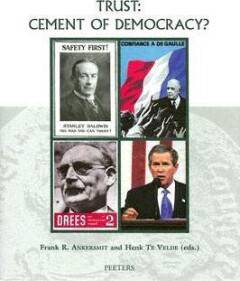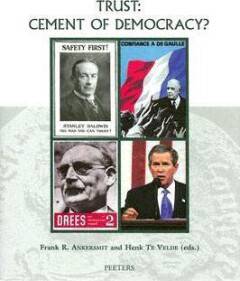
Bedankt voor het vertrouwen het afgelopen jaar! Om jou te bedanken bieden we GRATIS verzending (in België) aan op alles gedurende de hele maand januari.
- Afhalen na 1 uur in een winkel met voorraad
- In januari gratis thuislevering in België
- Ruim aanbod met 7 miljoen producten
Bedankt voor het vertrouwen het afgelopen jaar! Om jou te bedanken bieden we GRATIS verzending (in België) aan op alles gedurende de hele maand januari.
- Afhalen na 1 uur in een winkel met voorraad
- In januari gratis thuislevering in België
- Ruim aanbod met 7 miljoen producten
Zoeken
Omschrijving
The last twenty years have witnessed the world-wide triumph of democracy. We now know that democracy is the only political system that enables us to face the challenges of modernity and of the future. But we also know that democracy is more than democratic institutions alone. Democracy must also somehow be inscribed in the hearts of the citizens. What, then, are the socio-psychological demands of democracy? There is near to unanimous agreement that trust is decisive here: democracy can only thrive in a society of citizens prepared to trust each other and acting on the belief that mutual benefits are to be expected from co-operation. Thus far research has preferred to focus on trust between private citizens or groups of private citizens. The political dimension of trust has only rarely been addressed. The present collection of historical and theoretical studies attempts to fill this lacuna. It answers the question of why and under what circumstances citizens will trust or distrust the democratic state. It also addresses a paradox of democracy: democracy needs the 'cement of trust', but trust should not be given unconditionally.
Specificaties
Betrokkenen
- Auteur(s):
- Uitgeverij:
Inhoud
- Aantal bladzijden:
- 177
- Taal:
- Engels
- Reeks:
- Reeksnummer:
- nr. 11
Eigenschappen
- Productcode (EAN):
- 9789042915343
- Verschijningsdatum:
- 31/12/2004
- Uitvoering:
- Hardcover
- Formaat:
- Genaaid
- Afmetingen:
- 168 mm x 249 mm
- Gewicht:
- 498 g

Alleen bij Standaard Boekhandel
+ 183 punten op je klantenkaart van Standaard Boekhandel
Beoordelingen
We publiceren alleen reviews die voldoen aan de voorwaarden voor reviews. Bekijk onze voorwaarden voor reviews.









